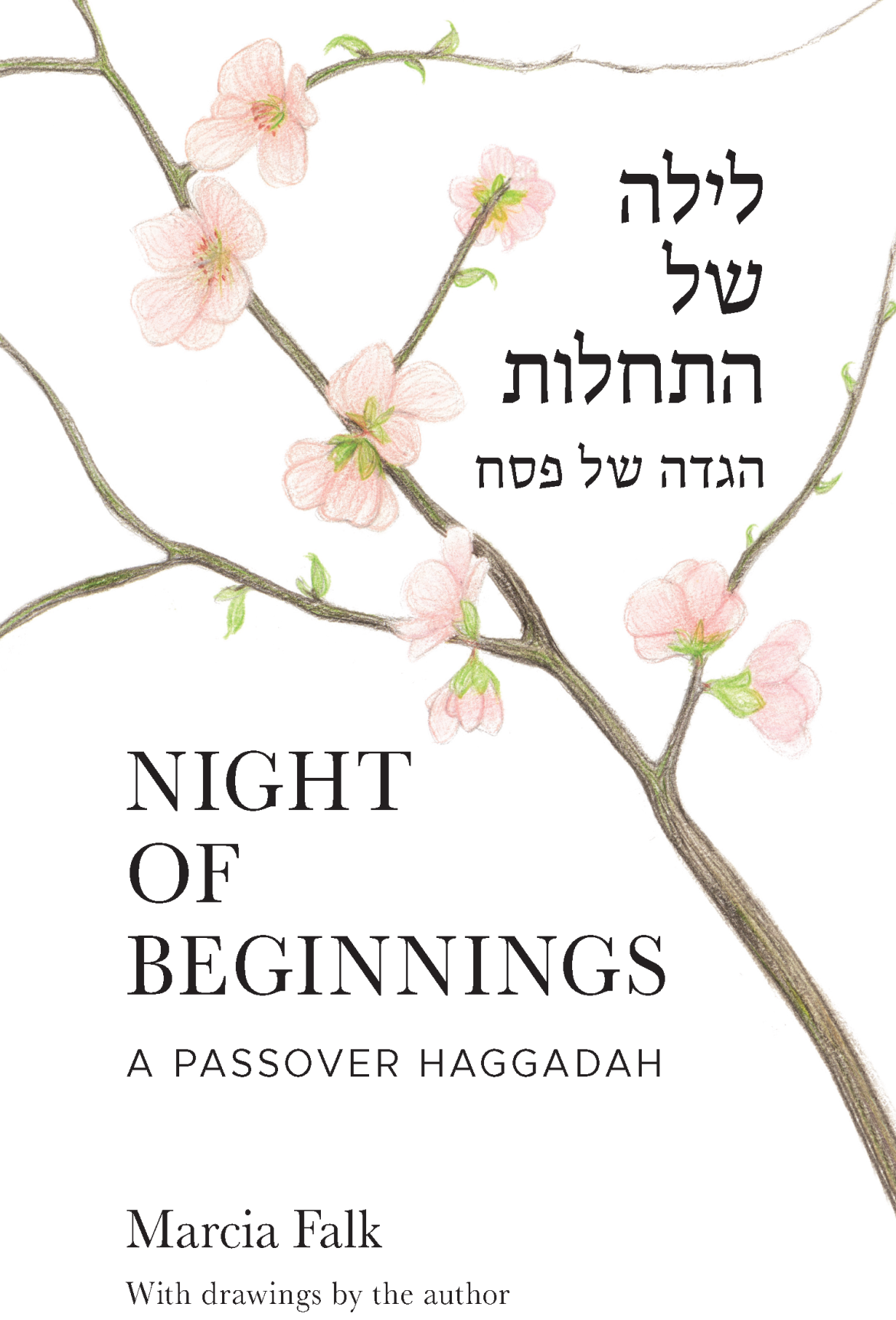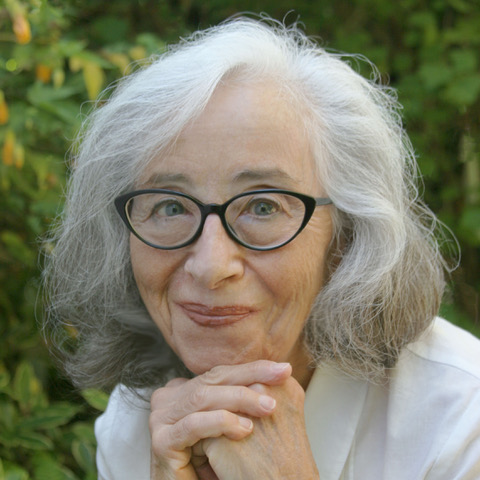Review of Marcia Falk, Night of Beginnings: A Passover Haggadah
(Jewish Publication Society,197 pp. $19.95; 40-50% off at https://jps.org/?s=Falk)
When Marcia Falk produced her Book of Blessings in 1996, one of her dedications was to “klal Yisrael,” the Jewish people. To us, she offered this short prayer: “May the words of my mouth and the meditations of my heart find favor.” The formulation is traditional, a quotation from Psalms imported into the Siddur, yet in removing the divine addressee that comes at the end of the original prayer, Falk made us, not God, the audience for her declarations of blessing and praise. Deciding to make humans the sole channel of blessing was a bold move, which she has carried out consistently––in that book and in the subsequent volume, The Days Between (2014), an alternative prayer book for the High Holidays, and now in this elegant, and eloquent Night of Beginnings: A Passover Haggadah (2022).
Since Falk began sharing her formula for blessings in the Havurah movement of the 1980’s, I have delighted whenever I’ve seen her words find favor, whether it be with people choosing to sing her words for Birkat ha-Mazon, the blessing after meals (with the singable tune by Linda Hirschhorn and Fran Avni) or in blessing children on Friday nights, her version now appearing in a Siddur written for a secular kibbutz in the Galilee. With the publication of this Haggadah, the North American Jewish community is getting its best chance yet of being exposed to Falk’s innovative and deeply thoughtful approach to liturgy. I think it has a far better chance than ever before of entering the mainstream because so many of us want a Haggadah to which we can relate and make our own.
Falk’s work is primarily addressed to secular Jews who want to express wonder for the universe in which we find ourselves and gratitude for the Jewish tradition that has so beautifully developed mitzvot, practical and ceremonial ways to embody the values of compassion, freedom, and justice. Yet in her introduction to the Haggadah, Falk now calls her approach a theology, and invokes “the Divine,” which she defines as “the ineffable, the sacred.” While this claim may somewhat enlarge the circle of those drawn to Falk’s work, I don’t believe it is wholly apposite. All the liturgical language in the Haggadah is congruent with the naturalistic approach to religious language that she has taken great pains to develop over the last thirty-five years. In her language for blessing, the “sacred” is not created by invoking a supernatural power; rather, it is we who make the day sacred through our declarations about it. Admittedly it’s hard to wrap our minds around the idea that the Big Bang that started our universe has led directly to us, but is this greater story really “ineffable,” that is, too great a mystery to be expressed in words? Here are Falk’s words for it: “Not even ourselves are ours to have. We belong to a wholeness so great we cannot even conceive of it…. We are simply part of it. We came out of it, and we will return to it. We do not ever leave it, we are part of it forever.” Falk is a wonderful poet and wordsmith in both Hebrew and English; we are greatly in her debt that the holiday ritual that she has set forth for us to celebrate is indeed effable, described in such wonderfully rich and memorable words as those I have just quoted.
Take the example of one of the early Seder rituals, the blessing of having reached a special time, known in Hebrew as the “shehecheyanu.” Falk offers us these words to declare: “Let us bless the flow of life/ that revives us/ sustains us/ and brings us to this time.” This hews very close to the traditional language of the blessing, though without mentioning God as the presence responsible for time’s flow. There is nothing here that a believer could not affirm and there is nothing that would stick in the craw of a humanist. We see a similar, but more expansive approach in the declaration that accompanies our eating of karpas, the green vegetable that serves as an hors d’oeuvre, the only food we eat before dinner: “At this Festival of Spring,/ as we welcome the newly budding year,/ let us bless the source that awakens the greening of the earth.” Falk’s repeated key phrase, “let us bless”––in Hebrew, nevarekh––is an invitation to connect us to the natural processes that sustain our lives. In so much of our modern experience living indoors and driving cars from place to place, we are divorced from nature, seeing what’s around us as an “it,” rather than a process to which we are integrally connected. If we take seriously the language of blessing that Falk offers us, we can begin to heal that rift and inspire ourselves to act not just for our own good, but for the good of all species on the planet that is our shared home.
Given all that I’ve said about Falk’s naturalistic approach to religious language and to the springtime aspects of this holiday, it is of great interest that Falk chose to focus the Maggid, the narrative portion of the Haggadah, on the biblical story, where God is indeed the hero of the story and Moses is God’s messenger. Her claim is that most contemporary haggadot, honoring the midrashic thrust of the traditional Haggadah, exclude the basic story of Exodus 1-15, even as they go about elaborating on it. The chief gain from this approach is that Falk devotes two of her six sections of the story to focus on the women in the biblical tale and thereby redress a historic imbalance in the traditional Haggadah, which did not mention women at all. By recentering Exodus, Falk also widens her appeal to more traditional Seder attendees who might balk at eliminating God’s role entirely.
The excellent commentary that she weaves around the story must satisfy those of us who want to talk about enslavement and liberation in non-theological terms. Much of her commentary focuses on the theme of what’s hidden and what’s revealed––not just in the hidden matzoh, the Afikomen that must be found, but in terms of self-awareness and awareness of others. “Self-awareness—being revealed to oneself––is a necessary (though not sufficient) condition for freedom. The less one is hidden from oneself, the greater one’s potential for self-actualization, the fruit of a freely chosen life,” Falk writes in the introduction. Lest one think that Falk’s Haggadah is yet another expression of what Phillip Rieff called “the triumph of the therapeutic,” it’s also important to note that Falk foregrounds community: “We find strength in the intersection of our lives with the lives and destinies of others. Community arises, sustaining and nourishing, as we seek to find our way.”
Communities are sustained by action. Commenting on the tradition of inviting others to our Seders, Falk challenges us to act on our awareness of what it means to be a sustaining community. “If we’re also to invite strangers in our midst––refugees, exiles, those without a home––we would place ourselves in a millennia-long tradition: our forefather welcomed strangers to his tent and, with the help of his wife, Sarah, and a servant, waited on them and gave them food and water.” Falk’s tone is encouraging, not hectoring. The most memorable Seder I’ve ever experienced is the one to which we invited our African-American next-door neighbors, in which our people’s story became a vehicle for telling the broader story of liberation that all peoples seek. Night of Beginnings is a tremendously inviting Haggadah that can accommodate many different configurations of people, religious, secular, Jewish, and non-Jewish.
I ordered a copy of this Haggadah because I always learn so much from Falk. After studying it, I ordered eight more copies because I want my children and grandchildren to experience her approach to Passover and to being Jewish. One particular passage has opened a door for me into our own family constellation. About “the child who cannot (will not?) ask,” Falk writes, “Why doesn’t she speak? Is she shy? Fearful of criticism or humiliation? Or is her silence a way to shield herself, giving herself the room to ask her own questions, unhindered by the questions and answers of others?” How can one not be moved by a Haggadah that is so perceptive about who might be sitting around the table? If I do a better job of making space for that child at this year’s Seder, it will be thanks to the gracious and generous wisdom of Marcia Falk.

